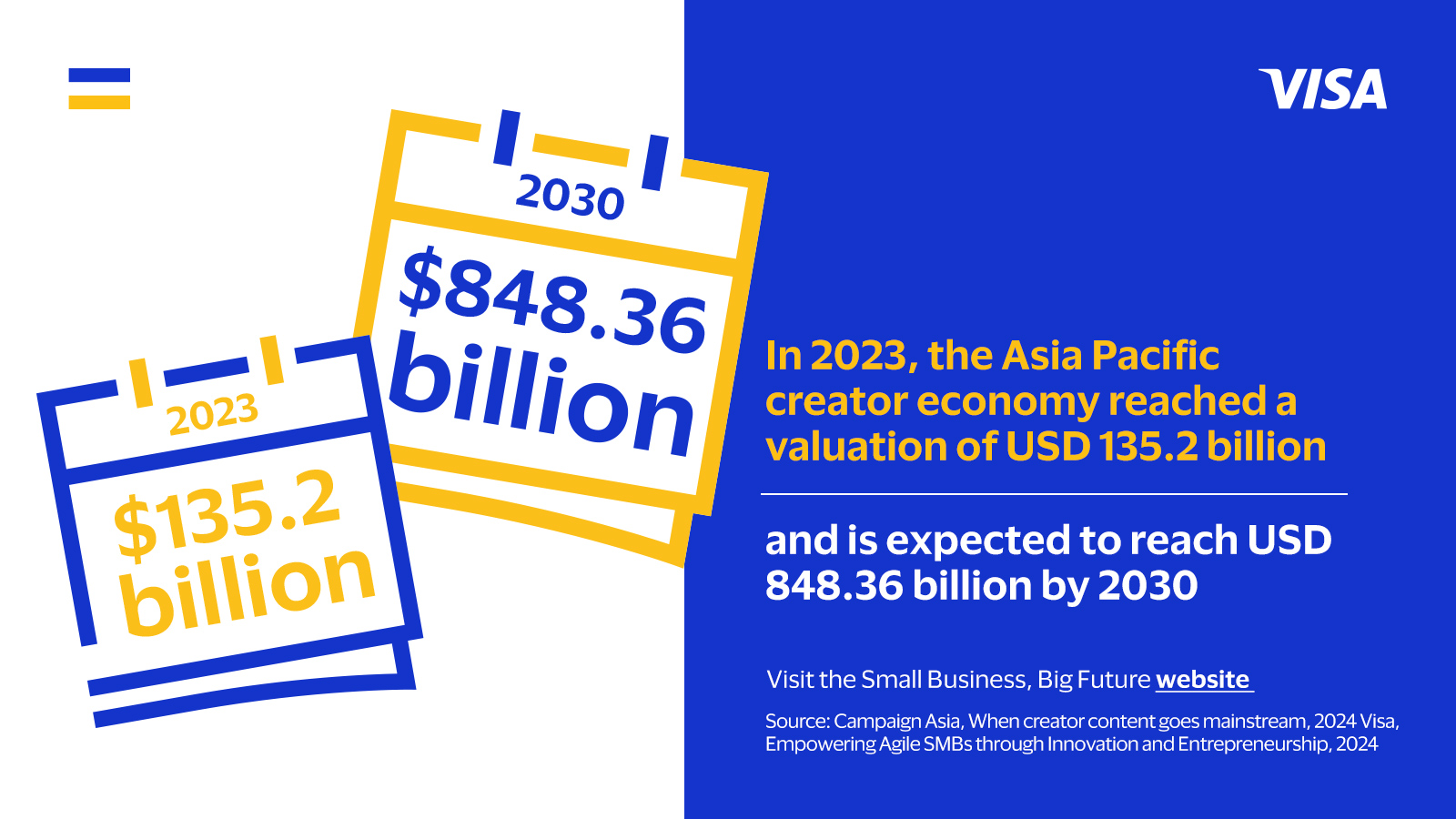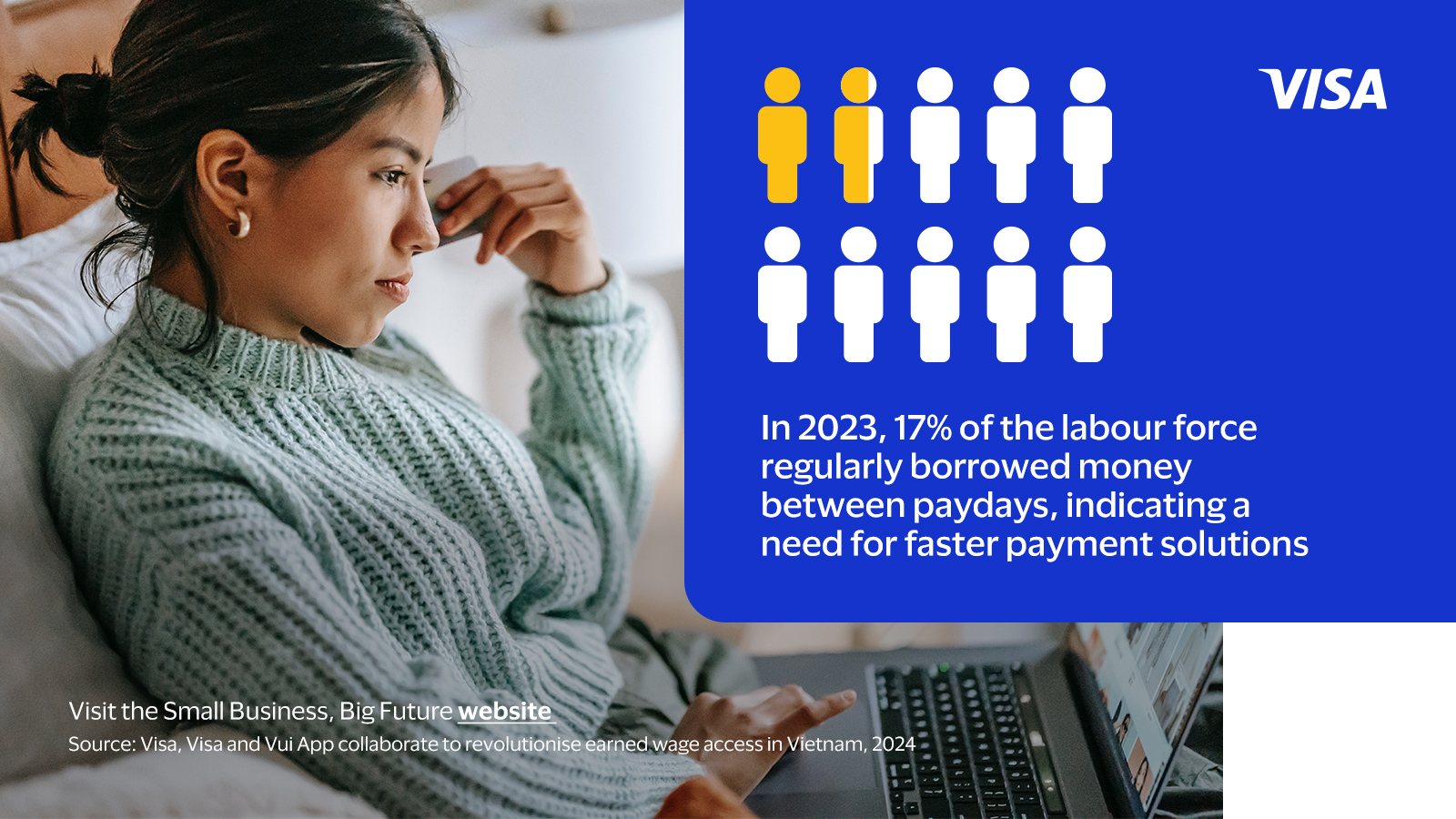Supercharging a new generation of SMBs with innovative payroll systems

Content creators have also become more popular in the region. In 2023, the region’s content creator economy was valued at USD135.2 billion.² It is expected to grow to USD848.36 billion by 2030.³ These creators consist of individuals or small teams that generate revenue through the content they produce and distribute online, usually on popular social media platforms. Through their content, they help themselves and their clients engage with today’s digital-savvy consumers.
Gig workers and creators function like micro-SMBs. Their smaller sizes allow them to quickly adapt to market changes, like viral content trends, and they usually engage in work that is shorter term and episodic. However, this also means that they require faster, more flexible payments from payroll systems.
Traditional payroll systems leave gig workers and content creators behind
Today’s traditional payroll systems are proving inadequate, leaving gig workers and content creators at a disadvantage. Here are some key challenges:
One significant issue faced by the new micro-SMBs is the slow payment speeds associated with conventional payroll systems. These rigid systems often operate on fixed pay cycles, which do not align with the immediate payment needs of short-term projects. As a result, gig workers and content creators may experience delays in receiving their earnings, which can adversely affect their retention and overall job satisfaction. Timely payment is crucial for maintaining a motivated and reliable workforce, and when payments are delayed, many micro-SMBs face financial strain. For example, a 2023 survey, conducted by Vietnam’s Policy and Law Department, revealed that 17 per cent of the labour force regularly borrows money due to insufficient funds between paydays, highlighting the urgent need for faster payment solutions in the gig and creator economies.⁴

Another key challenge for gig workers and content creators is the inflexibility of traditional payroll systems in accommodating their diverse payment needs. Conventional payroll systems are not designed to handle the irregular work schedules and varying payment amounts typical of gig and content work. Additionally, there is a notable absence of customisation options, making it difficult for businesses to tailor payroll processes to meet the specific needs of gig workers and content creators. This inflexibility not only hampers the ability of these new micro-SMBs to receive timely compensation but also limits businesses in effectively managing their workforce.
Managing taxes and compliance for gig workers and content creators presents another layer of complexity, especially since these workers may engage with multiple employers across different jurisdictions. The varying tax regulations across regions create an additional administrative burden for businesses striving to remain compliant. This complexity not only complicates payroll management but also increases the risk of non-compliance, which can lead to penalties and other costly repercussions for businesses.
Developing flexible, efficient payroll systems
To support this new wave of micro-SMBs, there is a pressing need for payroll systems that are fast, flexible, and tailored to their needs. One of the primary solutions is the integration of real-time payment systems. These systems ensure that gig workers and content creators receive their earnings immediately after completing a task, which enhances their financial security and satisfaction. For example, services like Visa Direct facilitate near-instant access to funds, even across borders, which can significantly improve worker motivation and loyalty while reducing financial stress for those relying on gig and creator incomes.⁵
Additionally, flexible payroll platforms are essential for accommodating the dynamic nature of the gig and creator economies. These platforms must be capable of handling variable payment schedules, multiple payment methods, and diverse tax requirements. For instance, Visa's partnership with Nano Technologies (Nano) on Nano’s Vui App exemplifies how payroll systems can offer on-demand pay for gig workers and content creators. The collaboration focuses on facilitating Earned Wage Access (EWA), a service that grants these micro-SMBs access to a portion of their earned wages before the end of conventional payroll cycles. By empowering gig workers and content creators with flexible access to their earnings, EWA helps reduce reliance on high-interest loans and credit cards, thereby improving their financial stability and reducing debt.⁶
Moreover, advanced payroll platforms should integrate compliance tools to simplify the administrative burden for businesses paying gig workers and content creators. These tools can automate tax calculations and filings, ensuring compliance with local and international labour laws. For example, payroll systems can integrate Know Your Customer (KYC) processes using personal information gathered through the employer's HR systems. The KYC checks involve collecting salary-crediting account numbers and identification numbers of gig workers and content creators, ensuring compliance with regulatory requirements and enhancing the security of transactions.
Transforming payroll systems is crucial for enhancing the agility of gig workers and content creators. With the help of modern payroll solutions, micro-SMBs can sustain their cash flow and grow their businesses. Investing in contemporary payroll solutions is essential for remaining competitive. Businesses and the financial ecosystem should evaluate their current systems, identify areas for improvement, and collaborate with the right payment partners to implement necessary changes. This strategic approach will position the micro-SMBs for sustained growth and success in the evolving digital economy.
¹ Visa, How gig work is reshaping the way we earn and get paid in Asia Pacific, 2024.
² Campaign Asia, When creator content goes mainstream, 2024.
³ Visa, Empowering Agile SMBs through Innovation and Entrepreneurship, 2024.
⁴ Visa, Visa and Vui App collaborate to revolutionise earned wage access in Vietnam, 2024
⁵ Visa, Transform your global money movement with Visa Direct, accessed August 2024.
⁶ Visa, Visa and Vui App collaborate to revolutionise earned wage access in Vietnam, 2024